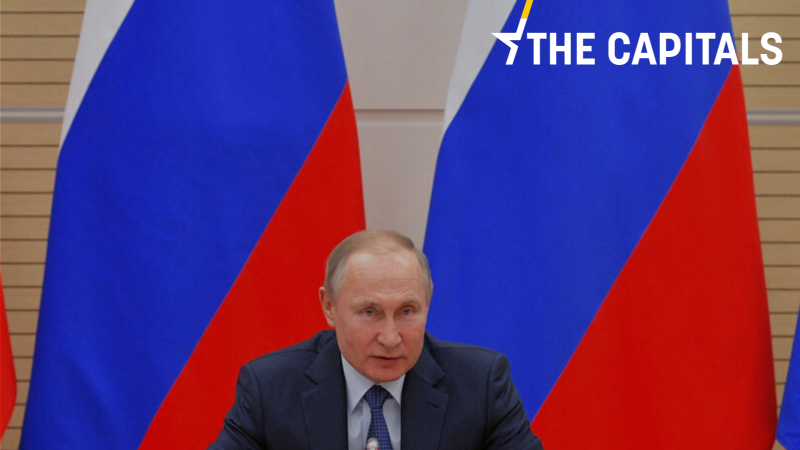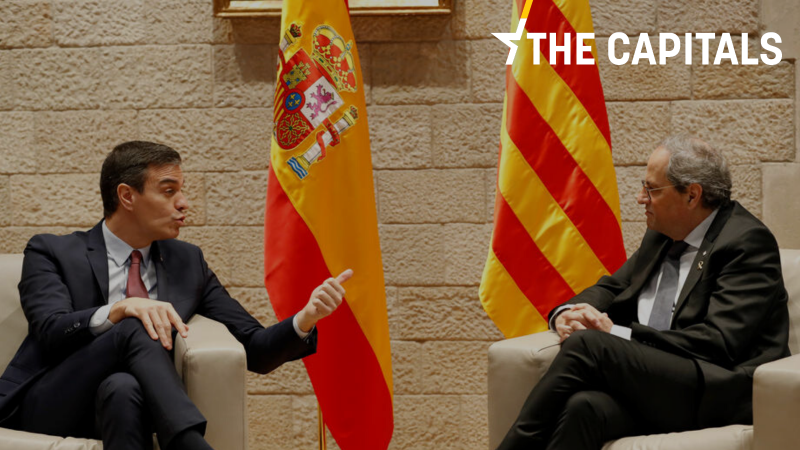
MADRID
Direct ‘dialogue’ between Sánchez and Catalans next week? Spain’s socialist PM Pedro Sánchez proposed on Wednesday (19 February) to hold a bilateral dialogue with Catalan’s separatist president, Quim Torra, to solve the “political crisis” in Catalonia next Monday (24 February), EURACTIV’s partner EFE reported. But the Catalan regional government, known as Generalitat, attacked Sanchez for disclosing the date of the meeting. EURACTIV’s partner EFE has more.
BERLIN
Röttgen in the race to succeed AKK as CDU chief. Chair for the Bundestag Committee on Foreign Affairs, Norbert Röttgen, has joined the race to become ruling conservative party CDU’s new leader, after Annegret Kramp-Karrenbauer announced her intention to resign as party leader on 10 February. Sarah Lawton has more detail.
PARIS
Le Maire and Altmaier ‘in love’ with the Commission’s data strategy. French Economy Minister Bruno Le Maire and his German counterpart, Peter Altmaier, issued a joint statement welcoming the European Commission’s data strategy and praised the new Commission for including digital issues on its agenda.
”Germany and France are supporting the European data process through joint initiatives on industrial policy and a European data infrastructure,” said Altmaier, while Le Maire said he expected the new strategy would enable the EU to develop an AI sector that can compete globally. (EURACTIV.FR)
LONDON
Immigration backlash. The backlash to the government’s tough new immigration rules is growing, particularly in Scotland where business and industry leaders joined politicians in condemning the scheme which will require would-be migrants, from the EU and elsewhere to have a job offer worth at least £25,600.
Industry bodies representing representing tourism, farming, fishing and care work said that the Johnson government’s refusal to take account of Scotland’s reliance on migrant workers strengthened the case for Scotland to have its own ‘differentiated’ migration policy. Last month, First Minister Nicola Sturgeon called on Scotland to be allowed to launch its own ‘Scottish visa’ to encourage EU migration. (Benjamin Fox, EURACTIV)
VIENNA
Airbus hands over names of ‘political contributions’ beneficiaries. In what has become one of Austria’s biggest corruption scandals, the names of 14 persons linked to the affair surrounding Austria’s purchase of 18 Eurofighter jets in 2003, for which Airbus admitted forking out €55 million in “political contributions”, have been submitted to the public prosecutor on request.
While the names have not yet been made public, an Airbus spokesperson expressed surprise, saying the names had been known by the prosecutor all along. (Philipp Grüll | EURACTIV.de)
BRUSSELS
Sabine takes charge. Sabine Laruelle (MR) has becomes the first woman in charge of a royal mission in the federal government coalition negotiations. Together with Patrick Dewael (Open VLD) she will report to the King on 9 March. Previously, the King had carefully selected a politically balanced due, now he has appointed two liberals for the job. (Alexandra Brzozowski | EURACTIV.com)
HELSINKI
Foreign minister under scrutiny. Finnish Foreign Minister Pekka Haavisto of the Greens is subject to investigations led by the parliament’s Constitutional Affairs Committee, and by the Prosecutor General in cooperation with the police.
Although Haavisto has been leading the polls to become Finland’s next president and has received backing from the PM and his party chair, he is now being investigated for having fired a senior minister official who had refused to repatriate Finnish children and women from the al-Hol refugee camp in Syria. EURACTIV’S Pekka Vänttinen takes a closer look.
EUROPE’S SOUTH
ROME
Renzi’s war cry. While Italy’s PM Giuseppe Conte is flying to Brussels for a “complex and complicated” EU summit, worries are mounting back home. Former PM Matteo Renzi, who keeps threatening to provoke a political crisis over the reform of legal procedures, accused other ruling parties of secretly tried to get rid of his centrist party Italia Viva, in the aim of finding other senators to back the executive, adding that the current government will most likely last until 2021. (Gerardo Fortuna | EURACTIV.com)
ATHENS
Government insists on closed type camps for migrants and refugees. The government is determined to proceed with its decision for the construction of closed hosting facilities for refugees and migrants, Alternate Migration Minister Giorgos Koumoutsakos told EURACTIV’s media partner AMNA’s radio station on Wednesday (19 February). EURACTIV Greece’s Theodore Karaoulanis reports.
Sassoli: Building walls is ‘useless’. “It is useless to build walls. I think it just proves that governments are trying to show the public that they are taking some action. It would be much better for everyone to come together to create a European immigration policy. The walls have never solved problems, either on land or in the seas,” European Parliament chief David Sassoli told Greece’s MEGA TV. The Greek government recently decided to install a “floating protection system” in the Aegean Sea to stop migrants arriving from the Turkish coast. (Sarantis Michalopoulos | EURACTIV.com]
LISBON
Euthanasia returns to parliament. The Portuguese parliament is debating and voting this Thursday (20 February) on five bills to decriminalise euthanasia, at a time when pressure for a referendum from groups that are against the measure is mounting. The last time the ‘euthanasia debate’ graced parliament was back in 2018 when decriminalisation was rejected by five votes. Now, with over half of Portugal’s population favouring decriminalisation, the signatory parties in parliament are confident that the bills to decriminalise euthanasia will be passed. (Sónia Ferreira and Susana Oliveira, Lusa.pt)
VISEGRAD
WARSAW
Flexing muscles. While the Chief of the Supreme Audit Office (NIK), Marian Banaś, has ordered an investigation into the country’s justice ministry and National Public Prosecutor’s Office, the current Public Prosecutor General, Zbigniew Ziobro, has ordered the Central Anti-Corruption Bureau (CBA) to search Banaś’ house based on allegations that he had submitted false financial declarations.
Although initially supported by the ruling Law and Justice (PiS) party, the allegations against Banaś which surfaced after a former NIK agent revealed the office’s operational methods against the opposition, have deepened the wedge between Banaś and the ruling party, which is cutting ties with the man. But Banaś will not go down without a fight, as he has pledged to hurt the ruling party on his way out. (Łukasz Gadzała | EURACTIV.pl)
BUDAPEST
Hungary to ban single-use plastics next year. At the press conference presenting Hungary’s climate and nature protection action plan, Innovation and Technology Minister László Palkovics explained that next year the government will be banning the retail of disposable plastics and take measures to replace mass-produced, disposable products with reusable, recyclable ones. EURACTIV’s Vlagyiszlav Makszimov looks into what other environmental measures the Hungarian government is planning to implement.
In other news, Hungary will upgrade its relationship status to a strategic partnership with Kyrgyzstan during the visit of Sooronbay Jeenbekov, the president of Kyrgyzstan set to take place in April, said Foreign Affairs Minister, Péter Szijjártó. Hungary has opened an embassy in Bishkek with 11 staff and the minister said that the European Commission cleared the way for Hungary to sign an investment protection agreement with Kyrgyzstan in April, with the purpose of “strengthening the legal foundations of their relationship”. (Željko Trkanjec | EURACTIV.hr)
PRAGUE
No high hopes. Czech Prime Minister Andrej Babiš told the EU affairs committee of the Chamber of Deputies yesterday that he does not expect the upcoming EU special summit to reach an agreement on the 2021-2027 multiannual budget framework since member states have radically different positions on the matter, Czech News Agency reports.
Babiš considers the EU’s draft financial framework to be unbalanced as it benefits richer countries but did not saying he was considering using a veto. (Ondřej Plevák | EURACTIV.cz)
BRATISLAVA
Filibustering in parliament. An extraordinary session of parliament was called by the government parties to pass two laws substantially increasing social benefits and to ultimately reject the Istanbul Convention on preventing combating violence against women and domestic violence.
The group of opposition MPs, who claim the session would disrespect the laws and rules of procedure so close to the election, which is just ten days away, is blocking the speaker’s desk, forcing the parliament’s Speaker to postpone the session. (Zuzana Gabrižová | EURACTIV.sk)
NEWS FROM THE BALKANS
ZAGREB
Freemason Attorney General resigns. Attorney General Drazen Jelenic has resigned, the State Attorney’s Office announced on Wednesday, because of his membership to the Freemasons lodge, despite him claiming that this had never affected his work or the court’s independence, reports Hina and Jutarnj list. EURACTIV Croatia’s Karla Junicic has more.
SOFIA
Gas debate and Victory parade. Bulgarian President Rumen Radev has accepted an invitation by Russian counterpart Vladimir Putin to attend the 9th May Victory parade in Moscow.
Radev initiated a phone conversation with Putin about bilateral negotiations regarding the prices for the supply of Russian natural gas to Bulgaria. “I hope that with political will from both sides we’ll achieve mutually beneficial prices and terms for the deliveries of natural gas from Russia to Bulgaria,” Radev said.(Krassen Nikolov | EURACTIV.bg)
LJUBLJANA
Nuclear power plant needs environmental impact assessment. The Administrative Court upheld the NGO complaint that the 50%-Croatian-owned Nuclear Power Plant Krško (NEK), which happens to also be the only plant in Slovenia close to Croatia, needs to undergo an environmental impact assessment if it wants to continue operating until 2043. (Željko Trkanjec | EURACTIV.hr)
In other news, Slovenia still has a caretaker government and it’s ‘business as usual’ for the parliament. It is still unclear whether a solution to the current deadlock will be the forming of a new coalition government or holding snap elections. (Željko Trkanjec | EURACTIV.hr)
BELGRADE
US Special Envoy denies support of ‘land swap plan’. US President Donald Trump’s special envoy for the Balkans, Richard Grenell, denied on Wednesday (19 February) that a plan on the exchange of territory between Serbia and Kosovo is still popular among US circles. “Fake news,” Grenell tweeted, reacting to a report by the EU Observer’s portal on the territory swap idea and claiming that the US special envoy continues to promote the idea of a ‘quick deal’ on Serbia’s recognition of Kosovo. EURACTIV Serbia has the story.
In other news, Serbia has lost €461 million since Kosovo introduced taxes on Serbian goods 14 months ago, Serbian Minister of Trade, Tourism and Communications, Rasim Ljajic told RTS public service on Wednesday (19 February).(EURACTIV.rs)
SARAJEVO
Constitutional Court decisions are binding. Decisions of the Constitutional Court are final and binding and must be implemented by the respective authorities, the Peace Implementation Council Steering Board (PIC SB) – a body overseeing Bosnia’s peace process – said last week. The statement, which wasn’t backed by the Russian Federation, was issued in light of recent developments in the country after officials from Bosnia’s Serb-majority part said they would block the decision-making process in state institutions. (Željko Trkanjec | EURACTIV.hr)
[Edited by Sarantis Michalopoulos, Daniel Eck, Benjamin Fox]






Komentari
0